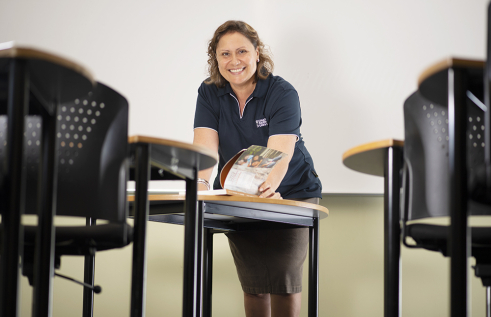Informed and reflective research is crucial to ensuring equitable outcomes for researchers and participants.
These resources are aimed at researchers, academic supervisors, and graduate students who are researching in Indigenous spaces, topics, or communities. They will assist in exploring the issues, challenges, and adaptations needed to make research practice ethical.
Thanks to all the researchers for sharing their lived research experiences for this resources page.
For information pertaining to research projects at CDU, the Northern Institute is the main hub for research expertise with researchers being recognised nationally and internationally as leaders in their fields.
Research at the Northern Institute
- is undertaken in a positive view of living in remote and regional contexts
- recognises the leadership that people in the region diverse lives and knowledge systems
- appreciates the value of understanding diversity is a strength.
Indigenous people are a significant portion of the population in Northern Australia, who manage a large proportion of the region's land and sea country and reflect a high social and economic investment of high priority.
YouTube library
Indigenous researchers speak out
Welcome to country or acknowledgement of country
Ms Bilawarra Lee, Larrakia Academic in Residence, CDU
Why it is important for Aboriginal and Torres Strait people to complete higher degrees by research
Ms Robyn Ober, Research Fellow, Batchelor Institute
Why is it important for Indigenous Australians to gain HDR qualifications
Dr Kellie Pollard, Research Fellow, CDU
Professor Steve Larkin - PHD journey
Professor Steven Larkin, Former Pro Vice-Chancellor Indigenous Leadership, CDU - Current CEO Batchelor Institute of Indigenous Tertiary Education
Indigenous researchers for Indigenous community research
Ms Valda Shannon, HDR student, CDU
Indigenous people have their own solutions
Mr Geoffrey Shannon, HDR student CDU
Aboriginal researchers needed for change
Mr Geoffrey Shannon, HDR student CDU
Winner of the SAGE Publishing scholarship
Dr Tracy Woodroofe, Senior Lecturer, College of Indigenous Futures, Arts and Society, CDU
Researching in the Indigenous space
Thinking about research with Indigenous communities
Mr Greg Williams, Senior Lecturer, College of Indigenous Futures, Arts and Society, CDU
Non - Indigenous researchers working in the Indigenous space
Dr Sarah Ireland, Research Fellow, CDU
Non Indigenous researching on the Indigenous space
Dr Eva McRae-Williams Research Fellow, Batchelor Institute
Indigenous research - using the right tools
Ms Valda Shannon, HDR student, CDU
Cultural protocols for researching Aboriginal communities - gender
Mr Geoffrey Shannon, HDR student CDU
Researching with Indigenous communities
Ms Bilawarra Lee, Larakia Academic in Residence, CDU
Supervising students researching in Indigenous spaces
What makes a good academic supervisor from an Indigenous student perspective
Ms Robyn Ober, Research Fellow, Batchelor Institute
Supervising Indigenous HDR students
Mr Greg Williams, Senior Lecturer, College of Indigenous Futures, Arts and Society CDU
What makes a good academic supervisor from an Indigenous student perspective
Dr Kellie Pollard, Research Fellow, CDU
Supervising Indigenous HDR students (Eva McRae - Williams)
Dr Eva McRae-Williams, Research Fellow, Batchelor Institute
Indigenous Research Frameworks (Curtis Roman)
Dr Curtis Roman, Former Head of School, School of Indigenous Knowledges and Public Policy
Timely feedback
Dr Eliani Boton, Former Whole of Community Engagement, CDU
Accessing Indigenous communities
Practical tips for researchers going to remote Indigenous communities
Ms Billwara Lee, Larrakia Academic in Residence, CDU
Cultural protocols and research with Indigenous communities
Dr Curtis Roman, Former Head of School, School of Indigenous Knowledges and Public Policy, CDU
Yalu: Doing research with Yolngu
Yalu
Gaining access - warming the ground
Ms Valda Shannon, HDR student, CDU
Cultural protocols when researching with australian Aboriginal communities
Ms Valda Shannon, HDR student, CDU
Researcher access to Aboriginal communities
Mr Geoffrey Shannon, HDR student CDU
Taking ethics seriously
Research with Indigenous people - procedural and practical ethical consent
Dr Sarah Ireland, Research Fellow, CDU
Reciprocity in research with Indigenous people in Australia
Dr Sarah Ireland, Research Fellow, CDU
Indigenous research - Using research data
Dr Sarah Ireland, Research Fellow, CDU
Cultural protocols when researching with Australian Aboriginal communities
Ms Valda Shannon, HDR student, CDU
Gaining informed consent in aboriginal communities
Ms Valda Shannon, HDR student, CDU
Being, knowing, doing: ontology, epistemology, methodology
Indigenous Research Frameworks
Dr Curtis Roman, Former Head of School, School of Indigenous Knowledges and Public Policy
Knowledge making in cross cultural research
Mr Greg Williams, Senior Lecturer, College of Indigenous Futures, Arts and Society CDU
Indigenous research methods
Ms Robyn Ober, Research Fellow, Batchelor Institute
Working with interpreters and Indigenous research assistants
Indigenous research - using interpreters
Dr Sarah Ireland, Research Fellow, CDU
Researching with Interpreters
Dr Michele Wilsher, Student Co-ordinator, Batchelor Institute
When you need research interpreters
Mr Geoffrey Shannon, HDR student CDU
You might also be interested in
-
Projection Augmented Landscape Models
Learn moreThe use of innovative Projection Augmented Physical Landscape technology is bringing science and local Indigenous knowledge together in a way that facilitates two-way learning about environmental history and science in the very diverse, cross-cultural, cross-linguistic space of northern Australia.
-

The future of Indigenous education in Australia
Watch nowDr Woodroffe’s research explores the importance of pre-service Indigenous cultural teacher education in the urban context by talking to both new and more experienced teachers.
-
Dr Sarah Ireland discusses her work in the remote region of Arnhem Land
Learn moreDr Ireland's research project, 'Caring for Mum on Country', looks at how Indigenous knowledge can be used to empower women to become "Doula", Indigenous childbirth companions.